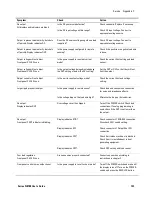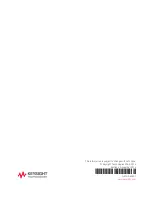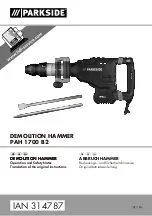
Compatibility Appendix D
Series N8700 User’s Guide
141
Compatibility Command Summary
The following table documents the compatibility commands that the
Keysight N8700 power supplies support. All compatibility commands
are accepted; however, some commands do nothing.
Compatibility Command
Description
Similar SCPI Command
ASTS?
Note 1
Queries the accumulated status (ASTS). The response represents the
sum of the binary weights of the ASTS register bits. The ASTS register is
set to the present status after being queried.
STAT:OPER:EVEN?
STAT:QUES:EVEN?
*ESE?
CLR
Returns the power supply to the power-on state. Same as *RST.
*RST
DLY <delay>
Generates error 203.
DLY?
Generates error 203.
ERR?
Queries the present programming or hardware error. An error code
number is returned over the GPIB to identify the error. The error register
is cleared after being read.
SYST:ERR?
FAULT?
Note 1
Queries the fault register. A bit is set in the fault register when the
corresponding bit in both the status and the mask registers. The
response is an integer 0 to 255. The fault register is cleared after being
read.
STAT:OPER?
STAT:QUES?
*ESE?
FOLD
Turns the OCP on or off. This is only allowed for constant current mode
(FOLD 2). Constant voltage mode (FOLD1) generates error 203.
CURR:PROT:STAT
FOLD?
Queries the OCP setting. The response is FOLD 2.
CURR:PROT:STAT?
HOLD
When turned on (HOLD 1), causes the VSET, ISET, FOLD, and UNMASK
values to be held until a trigger occurs. This only applies to the
compatibility functions, not the SCPI functions
VOLT:TRIG
CURR:TRIG
HOLD?
Queries the hold setting. The response is HOLD 1.
ID?
Queries the identification (model number) of the power supply.
*IDN?
IMAX
Sets a soft programming limit for current. Attempting to program the
current above this setting will generate an error.
IMAX?
Queries the IMAX setting. The response is a real number.
IOUT?
Queries the measured output current. The response is a real number.
MEAS:CURR?
ISET <current>
Sets the output current.
CURR
ISET?
Queries the present current setting. The response is a real number.
CURR?
OUT <on|off>
Turns the output on or off. On/off equals 1 turns the output on; equals 0
turns the output off.
OUTP:STAT
OUT?
Queries whether the output is turned on or off . The response is OUT 1
(on)
or
OUT O (off). The front panel displays OFF when the output is off.
OUTP:STAT?
OVP
Sets the over-voltage trip point.
VOLT:PROT:LEV
OVP?
Queries the present over-voltage setting. The response is a real number.
VOLT:PROT:LEV?







































